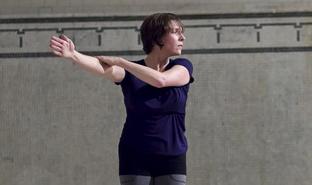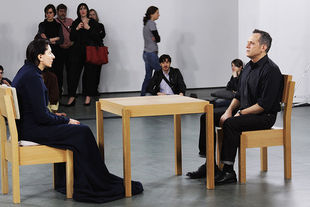 Sara Wookey performing "Trio A" (1966) by Yvonne Rainer at VIVA! Performance Festival, Montreal. Photo: Guy L'Heureux November 23, 2011 - I participated in an audition on November 7th for performance artist Marina Abramovic’s production for the annual gala of the Museum of Contemporary Art, Los Angeles. I auditioned because I wanted to participate in the project of an artist whose work I have followed with interest for many years and because it was affiliated with MOCA, an institution that I have a connection with as a Los Angeles-based artist. Out of approximately 800 applicants, I was one of two hundred selected to audition. Ultimately, I was offered the role of one of six nude females to re-enact Abramovic's signature work, "Nude with Skeleton" (2002) (see video explanation of the work below), at the center of tables with seats priced at up to $100,000 each. For reasons I detail here — reasons that I strongly believe need to be made public — I turned it down. I am writing to address three main points: One, to add my voice to the discourse around this event as an artist who was critical of the experience and decided to walk away, a voice which I feel has been absent thus far in the LA Times and New York Times coverage; two, to clarify my identity as the informant about the conditions being asked of artists and make clear why I chose, up till now, to be anonymous in regards to my email to Yvonne Rainer; and three, to prompt a shift of thinking of cultural workers to consider, when either accepting or rejecting work of any kind, the short- and long-term impact of our personal choices on the entire field. Each point is to support my overriding interest in organizing and forming a union that secures labor standards and fair wages for fine and performing artists in Los Angeles and beyond. I refused to participate as a performer because what I anticipated would be a few hours of creative labor, a meal, and the chance to network with like-minded colleagues turned out to be an unfairly remunerated job. I was expected to lie naked and speechless on a slowly rotating table, starting from before guests arrived and lasting until after they left (a total of nearly four hours). I was expected to ignore (by staying in what Abramovic refers to as "performance mode") any potential physical or verbal harassment while performing. I was expected to commit to fifteen hours of rehearsal time, and sign a Non-Disclosure Agreement stating that if I spoke to anyone about what happened in the audition I was liable for being sued by Bounce Events, Marketing, Inc., the event’s producer, for a sum of $1 million dollars plus attorney fees. I was to be paid $150. During the audition, there was no mention of safeguards, signs, or signals for performers in distress, and when I asked about what protection would be provided I was told it could not be guaranteed. What I experienced as an auditionee for this work was extremely problematic, exploitative, and potentially abusive. I am a professional dancer and choreographer with 16 years of experience working in the United States, Canada, and Europe, and I hold a Master of Fine Arts degree in Dance from the University of California, Los Angeles. As a professional artist working towards earning a middle class living in Los Angeles, I am outraged that there are no official or even unofficial standard practice measures for working conditions, compensation, and benefits for artists and performers, or for relations between creator, performer, presenting venue and production company in regard to such highly respected and professionalized individuals and institutions such as Abramovic and MOCA. In Europe I produced over a dozen performance works involving casts up to 15 to 20 artists. When I hired dancers, I was obliged to follow a national union pay scale agreement based on each artist’s number of years of experience. In Canada, where I recently performed a work by another artist, I was paid $350 for one performance that lasted 15 minutes, not including rehearsal time that was supported by another fee for up to 35 hours, in accordance with the standards set by CARFAC (Canadian Artists Representation/Le Front Des Artistes Canadiens) established in 1968. |  Marina Abramovic performing "Artist is Present" at the MoMA in May 2010. Photo: Shelby Lessig If my call for labor standards for artists seems out of bounds, think of the Screen Actors Guild (SAG, established 1933), the American Federation of Musicians (AFM, founded 1896), or the umbrella organization the Associated Actors and Artistes of America (the 4A’s, founded in 1919), which hold the film, theater and music industries to regulatory and best practice standards for commercial working artists and entertainers. If there is any group of cultural workers that deserves basic standards of labor, it is us performers working in museums, whose medium is our own bodies and deserve humane treatment and respect. Artists of all disciplines deserve fair and equal treatment and can organize if we care enough to put the effort into it. I would rather be the face of the outspoken artist then the silenced, slowly rotating head (or, worse, "centerpiece") at the table. I want a voice, loud and clear. Abramovic’s call for artists was, as the LA Times quoted, for “strong, silent types.” I am certainly strong but I am not comfortable with silence in this situation. I refuse to be a silent artist regarding issues that affect my livelihood and the culture of my practice. There are issues too important to be silenced and I just happen to be the one to speak out, to break that silence. I spoke out in response to ethics, not artistic material or content, and I know that I am not the only one who feels the way I do. I rejected the offer to work with Abramovic and MOCA — to participate in perpetuating unethical, exploitative and discriminatory labor practices — with my community in mind. It has moved me to work towards the establishment of ethical standards, labor rights and equal pay for artists, especially dancers, who tend to be some of the lowest paid artists. The time has come for artists in Los Angeles and elsewhere to unite, organize, and work toward changing the degenerate discrepancies between the wealthy and powerful funders of art and the artists, mainly poor, who are at its service and are expected to provide so-called avant-garde, prescient content or "entertainment," as is increasingly the case — what is nonetheless merchandise in the service of money. We must do this not because of what happened at MOCA but in response to a greater need (painfully demonstrated by the events at MOCA) for equity and justice for cultural workers. I am not judging my colleagues who accepted their roles in this work and I, too, am vulnerable to the cult of charisma surrounding celebrity artists. I am judging, rather, the current social, cultural, and economic conditions that have rendered the exploitation of cultural workers commonplace, natural, and even horrifically banal, whether its perpetrated by entities such as MOCA and Abramovic or self-imposed by the artists themselves. I want to suggest another mode of thinking: When we, as artists, accept or reject work, when we participate in the making of a work, even (or perhaps especially) when it is not our own, we contribute to the establishment of standards and precedents for our cohort and all who will come after us. To conclude, I am grateful to Rainer for utilizing her position (without a request from me) of cultural authority and respect to make these issues public for the sake of launching a debate that has been overlooked for too long. Jeffrey Deitch, director of MOCA, was quoted in the LA Times as saying, in response to receiving my anonymous email and Rainer’s letter, “Art is about dialogue.” While I agree, Deitch’s idea of dialogue here is only a palliative. It obscures a situation of injustice in which both artist and institution have proven irresponsible in their unwillingness to recognize that art is not immune to ethical standards. Let’s have a new discourse that begins on this thought. Sara Wookey is an artist, choreographer, and creative consultant based in Los Angeles. Dani - I welcome your thoughts on this, as artist, as viewer, as beautiful skeleton. Comment below. |
|
0 Comments
Leave a Reply. |
Daniella Sforza
Il faut cultiver notre jardin. - Voltaire Archives
February 2015
Categories |

 RSS Feed
RSS Feed
